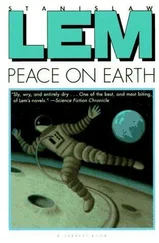Given that our civilization is unable to assimilate well even those concepts that originate in human heads when they appear outside its main current, although the creators of those concepts are, after all, children of the same age — how could we have assumed that we would be capable of understanding a civilization totally unlike ours, if it addressed us across the cosmic gulf? The metaphor of an army of tiny creatures that put to good use their encounter with the corpse of a philosopher still seems to me very fitting. Until such an encounter took place, my view might have been judged extreme, the attitude of a crackpot. But the meeting did come to pass, and the defeat we suffered in it represented a true experimentum crucis , a proof of our resourcelessness, and still the result of that proof was ignored! The myth of our cognitive universality, of our readiness to receive and comprehend information absolutely new — absolutely, since extraterrestrial — continues unimpaired, even though, receiving the message from the stars, we did with it no more than a savage who, warming himself by a fire of burning books, the writings of the wisest men, believes that he has drawn tremendous benefit from his find!
And so the recording of the history of our vain efforts may prove useful — if only to some later, future student of the First Contact — because the published accounts, those official reports, concentrate on the so-called successes, that is, on the pleasant warmth that emanates from the burning pages. Of the hypotheses we tried, one after another, practically nothing is said there. Such a course of action would have been permissible — I alluded to this already — had the thing investigated been kept separate, in the end, from its investigators. Those who study physics are not burdened with information about what incorrect, imprecise hypotheses, what false notions, were advanced by its creators; for how long Pauli groped about before he formulated, in the right way, his Principle; or the number of abortive conceptions Dirac tried before the fortunate guess of his electron “holes.” But the history of His Master’s Voice is the tale of a defeat: of wrong turns that were not followed by a straightened path. Thus one should not wipe away the zigzags of our journey, because those zigzags are all that is left us.
A considerable amount of time has passed since these events. I have waited patiently for a book like this one. But I cannot wait — for reasons purely biological — any longer. I availed myself of certain notes taken immediately after the closing of the Project. As for why I did not include them in one of my papers, that will become evident. There is one thing I would like to make clear. It is not my intention to raise myself above my colleagues. We stood at the feet of a gigantic find, as unprepared, but also as sure of ourselves, as we could possibly be. We clambered up on it from every side, quickly, hungrily, and cleverly, with our time-honored skill, like ants. I was one of them. This is the story of an ant.
A professional colleague to whom I showed my preface remarked that I had painted myself black in order to be able afterward to give free rein to my outspokenness, on the principle that those whom I took to task could not easily hold it against me if first I did such honors for myself. Though said half in jest, the observation struck me. So devious a design had not entered my head, and yet we are familiar enough with the mechanics of the mind to know that such protestations are worthless. It is possible that the remark was true, that an unconscious cunning had been in operation. The ugliness of my malice I made public; I localized it, in order to divorce myself from it — but I did this only in words.
Meanwhile, by stealth, it penetrated, permeated my “good intentions,” and all the time guided my pen, so that I proceeded like a preacher who, calling fire and brimstone down upon the foulness of man, finds a secret pleasure in at least describing what he dares not participate in actively himself. In this diametrically opposed view of the matter, what I held to be an unpleasant necessity dictated by the gravity of the subject becomes the primary motive, while the subject itself — His Master’s Voice — is a pretext that came conveniently to hand. But the framework of this reasoning, which one could call carrousel-like — in that it goes in circles, the premises and conclusions changing places — can in turn be attributed to the very substance of the Project. Our thinking must come up against some hard focal point of facts that sobers it and corrects it; in the absence of such a corrective, it easily turns into a projection of private flaws (or virtues, it doesn’t matter) — onto the plane of the thing studied. The reduction of a philosophical system to the biographical vicissitudes of its creator is considered (I know something of this) an occupation as petty as it is unsporting. But at the core of philosophy — which always wants to say more than is possible at a given time, because it represents an effort to “capture the world” in a closed conceptual net — even in the works of the most illustrious thinkers, there lies hidden an acute vulnerability.
Man’s quest for knowledge is an expanding series whose limit is infinity, but philosophy seeks to attain that limit at one blow, by a short circuit providing the certainty of complete and inalterable truth. Science meanwhile advances at its gradual pace, often slowing to a crawl, and for periods it even walks in place, but eventually it reaches the various ultimate trenches dug by philosophical thought, and, quite heedless of the fact that it is not supposed to be able to cross those final barriers to the intellect, goes right on.
How could this not drive the philosophers to despair? One form of that despair was Positivism, remarkable in its hostility, because it played the loyal ally of science but in fact sought to abolish it. The thing that had undermined and destroyed philosophy, annulling its great discoveries, now was to be severely punished, and Positivism, the false friend, passed that sentence — demonstrating that science could not truly discover anything, inasmuch as it constituted no more than a shorthand record of experience. Positivism desired to muzzle science, to compel it somehow to declare itself helpless in all transcendental matters (which, however, as we know, Positivism failed to do).
The history of philosophy is the history of successive and non-identical retreats. Philosophy first tried to discover the ultimate categories of the world; then the absolute categories of reason; while we, as knowledge accumulates, see more and more clearly philosophy’s vulnerability: because every philosopher must regard himself as a model for the entire species, and even for all possible sentient beings. But it is science that is the transcendence of experience, demolishing yesterday’s categories of thought. Yesterday, absolute space-time was overthrown; today, the eternal alternative between the analytic and the synthetic in propositions, or between determinism and randomness, is crumbling. But somehow it has not occurred to any of our philosophers that to deduce, from the pattern of one’s own thoughts, laws that hold for the full set of people, from the eolithic until the day the suns burn out, might be, to put it mildly, imprudent.
This initial equating of oneself with the norm of the species — an unknown — was, to be plain, irresponsible. One justification for it became the incessant desire to understand “everything” — a desire having only psychological value. Thus philosophy speaks of human hopes, fears, and longings at much greater length than it does of the essence of the completely indifferent world, a world that is an eternal constant of laws only for the news media.
Читать дальше












